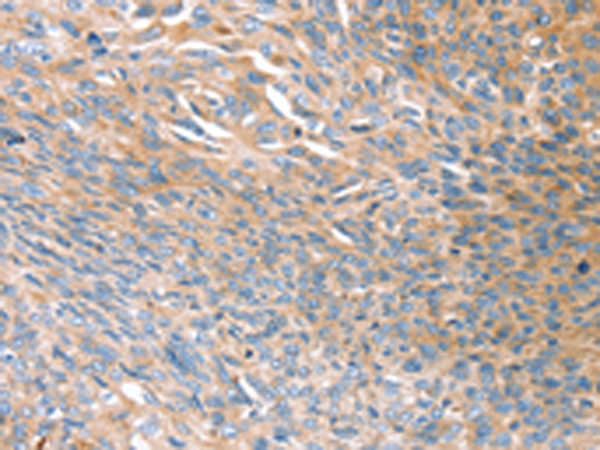

| WB | 咨询技术 | Human,Mouse,Rat |
| IF | 咨询技术 | Human,Mouse,Rat |
| IHC | 1/25-1/100 | Human,Mouse,Rat |
| ICC | 技术咨询 | Human,Mouse,Rat |
| FCM | 咨询技术 | Human,Mouse,Rat |
| Elisa | 1/2000-1/5000 | Human,Mouse,Rat |
| Aliases | CAP1; PROSTASIN |
| Host/Isotype | Rabbit IgG |
| Antibody Type | Primary antibody |
| Storage | Store at 4°C short term. Aliquot and store at -20°C long term. Avoid freeze/thaw cycles. |
| Species Reactivity | Human, Mouse, Rat |
| Immunogen | Synthetic peptide of human PRSS8 |
| Formulation | Purified antibody in PBS with 0.05% sodium azide and 50% glycerol. |
+ +
以下是关于PRSS8抗体的3篇参考文献及其摘要概括:
---
1. **文献名称**:*Prostasin (PRSS8) suppresses epidermal growth factor receptor (EGFR) signaling and regulates keratinocyte differentiation*
**作者**:Chen LM et al.
**摘要**:研究通过PRSS8特异性抗体揭示了其在表皮分化中的作用,证实PRSS8通过抑制EGFR信号通路调控角质形成细胞的成熟,并参与皮肤屏障功能的维持。
---
2. **文献名称**:*Prostasin serine protease and breast cancer progression*
**作者**:Mok SC et al.
**摘要**:利用PRSS8抗体分析乳腺癌组织样本,发现PRSS8表达水平与肿瘤转移风险呈负相关,提示其可能通过抑制蛋白酶活性限制癌细胞侵袭。
---
3. **文献名称**:*Prostasin regulates renal epithelial sodium channel (ENaC) activity via a proteolytic mechanism*
**作者**:Adachi M et al.
**摘要**:通过抗体验证PRSS8在肾脏上皮细胞中对ENaC的调控作用,表明其通过切割细胞外结构域激活钠通道,影响体液平衡与血压调节。
---
如需更详细的信息或更多文献,建议通过PubMed或Google Scholar以关键词“PRSS8 antibody”或“prostasin antibody”检索。
The PRSS8 antibody targets the protein encoded by the PRSS8 gene, also known as prostasin, a glycosylphosphatidylinositol (GPI)-anchored serine protease. Prostasin plays critical roles in epithelial barrier function, sodium homeostasis, and cellular signaling. It activates the epithelial sodium channel (ENaC) and interacts with protease inhibitors like LEKTI, influencing skin barrier integrity and blood pressure regulation. Dysregulation of PRSS8 is linked to pathologies such as hypertension, metastatic cancers, and Netherton syndrome, a severe genetic skin disorder.
PRSS8 antibodies are essential tools for detecting prostasin expression and localization in tissues or cell lines. They are widely used in Western blotting, immunohistochemistry (IHC), and immunofluorescence (IF) to study its role in epithelial differentiation, tumor progression, and inflammatory responses. Monoclonal and polyclonal variants exist, often validated for specificity using knockout controls or siRNA-mediated PRSS8 silencing. Some antibodies recognize specific epitopes, enabling differentiation between active and zymogen forms.
Research applications include exploring PRSS8 as a biomarker in cancers (e.g., prostate, ovarian) and its therapeutic potential in ENaC-related diseases. Challenges include cross-reactivity with homologous proteases, emphasizing the need for rigorous validation. Overall, PRSS8 antibodies advance understanding of protease-mediated pathways in health and disease.
×